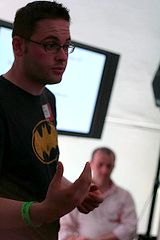One of the interesting topics to emerge from 2gether08, specifically the sessions on whether UK politics is ‘big enough’ for the web, and ‘egov to wegov‘, was where we stand on campaigning online, especially in comparison with the US.
This ties in neatly with a speech made by the Skills Minister, David Lammy, last week:
The danger, in a world where Westminster has created its own industry of think-tanks, lobbying firms, PR agencies and media outlets, is that we lose the rich diversity to a generation of politicians who have emerged not from the professions, the business community or the unions but from within Westminster itself.
It’s dangerous because people struggle to find the connections with this political class that seems to operate in a different world.
This has been picked up by a few commentators, such as Simon Dickson:
But he’s absolutely right: the [online] tools are cheap, often free, and easy. It’s not whether you can do it, it’s what you do with it. It’s also quite interesting to see him talking in terms of a ‘fightback’. It’s often said that campaigning is easier when you’re in opposition: by pre-emptively accepting defeat, could that kickstart Labour’s online efforts?
Andrew Grice in The Independant:
Mr Lammy was calling for a cultural revolution in our politics to reconnect it with the people, as Mr Obama has done. New Labour, he admitted, was never “a movement that filtered down to ordinary people”.
Andrew Sparrow in The Guardian:
It was a speech about the lessons to be learnt from the US presidential elections and Lammy’s intention, I’m sure, was to promote a debate about the way Labour should change, not to deliver any coded criticism of the prime minister.
But his message, or at least one of them, was that “the political messages and methods of the 1990s are beginning to look very tired and dated”, and time and time again he made points that it would be impossible to imagine Brown saying, or even supporting.
Paul Canning has written regularly about the Obama campaign, too:
In the UK internet use is already by a majority, is growing over other media use and is only going one way – up. I would imagine that the Tories are ahead of the game on this (my impression, though I’m advised it may well be the Libdems – it’s definitely not Labour) but once the real facts have been unpacked it would be a huge mistake for the other parties to just think ‘fundraising’ and not recognise that – as well as having a compelling candidate – running from the bottom-up, empowering supporters and making use of the Web’s power is really what’s behind Obama’s success.
So here’s the thing. Politicians need to connect with people through conversation, conversation that can be messy and result in a loss of control. It means that the politicians go on a journey themselves through their campaigns, learning from their electorate rather than lecturing them – and they need to tell the story of that journey so that others may connect with them.
The web provides the tools for this to happen, and can be deployed quickly and pretty cheaply. All the political parties should be looking across the Atlantic and identifying the lessons they could learn from both the primary elections just finished, and the presidential election to come.
They also need to be planning this now, because while this stuff is dead easy to do, it’s damn hard to do it well.

